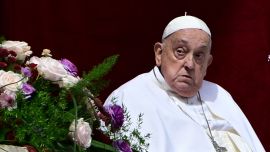Federal Judge Ariel Lijo, who has been nominated for a Supreme Court bench by President Javier Milei, faces a key week for his candidacy.
A Senate committee will host Lijo at Congress on Wednesday for a key hearing into his nomination.
As part of the process to confirm or reject his nomination for the nation’s highest tribunal, Lijo’s candidacy was announced in national newspapers for 10 days, while a notice announcing the news also appeared in the Official Gazette.
During the weeklong period in which citizens could submit objections or notices of support to the Senate Appointments Committee, Lijo received 33 challenges and 16 approvals, according to reporting by the Noticias Argentinas news agency.
Via the Executive branch, he received more than 3,500 notes of approval and 328 objections, according to data provided by the Justice Ministry.
In order to address the challenges, Lijo has now presented an extensive document seeking to answer over 400 questions supplied by citizens to the Senate defending his work as a magistrate.
Ahead of Wednesday’s hearing, organisers in the upper chamber are debating whether to limit the number of people who may enter attend, in order to prevent any commotion.
Lijo is one of the select members of Comodoro Py, the oft-questioned federal courthouse composed of 12 judges. Despite being a controversial figure, the candidate’s submission seems likely to bridge the gap between Kirchnerite lawmakers, opposition senators open to dialogue and ruling party members.
Last March, President Milei proposed Lijo cover the fifth spot on the Supreme Court following the exit of Elena Highton de Nolasco.
Constitutionalist and lawyer Manuel García Mansilla has been nominated to replace Juan Carlos Maqueda, who is turning 75 in December and will stand down upon reaching the age limit.
Unsettled
Lijo’s candidacy for the Supreme Court, promoted by President Javier Milei, has unsettled the establishment for better and for worse.
The federal judge took over a chamber at the Comodoro Py federal courthouse in Retiro, Buenos Aires City in 2004, when Néstor Kirchner was president, after clerking for the Federal Court of Appeals.
Lijo quickly emerged as a notable judicial figure, especially given his involvement in high-profile cases, including the investigation into alleged irregularities in the probe into the 1994 AMIA terrorist attack, in which ex-president Carlos Menem, former head of the SIDE Intelligence Service Hugo Anzorreguy and former judge Juan José Galeano, eventually stood trial.
In 2023, Lijo was in charge of the investigation over the terrorist attack, declassifying intelligence information linked to attack and its investigation at the request of complaints by victims and relatives grouped as Memoria Activa.
Lijo has also heard the cases addressing human rights violations during the 1976-1983 military dictatorship and oversaw cases looking into crimes against humanity including disappearances and torture.
The judge also heard the case probing the murder of late CGT umbrella union group leader José Rucci, which he investigated even though he did not deem it a crime against humanity.
Another high-profile case was the investigation into alleged corruption involving former vice-president Amado Boudou and the Ciccone Calcográfica firm. Boudou ended up in oral proceedings and was sentenced to time in prison.
As an offshoot, Lijo also investigated banker Jorge Brito over an alleged previous graft scheme, along with the former head of the AFIP Tax Office Ricardo Echegaray and Formosa Province Governor Gildo Insfrán.
Lijo also investigated former officials and businesspeople for alleged money-laundering via campaign contributions for the election which saw Cristina Fernández de Kirchner win the presidency in 2007. His name was also known due to the actions of his brother Alfredo Lijo, a lawyer who worked for the AGN General Auditor’s Office together with Javier Fernández, a court administrator at Comodoro Py.
He has been the target of criticism and reports by Coalición Cívica leader Elisa Carrió, who accused him of hatching a plot with his brother and former federal planning minister Julio De Vido to prevent progress in certain graft cases.
Lijo retains the support of his long term judicial ally, María Servini de Cubría; as well as a close bond with current Supreme Court justice Ricardo Lorenzetti.
This month, Lijo was denounced in the Senate for allegedly curbing a case involving a man who identified himself as a “victim of the biggest trafficking network in Argentina.”
“So far, Mr Lijo has only humiliated me, mistreated me, given the hardest time,” specified the man who filed his complaint in 2022.
– TIMES/PERFIL




















Comments